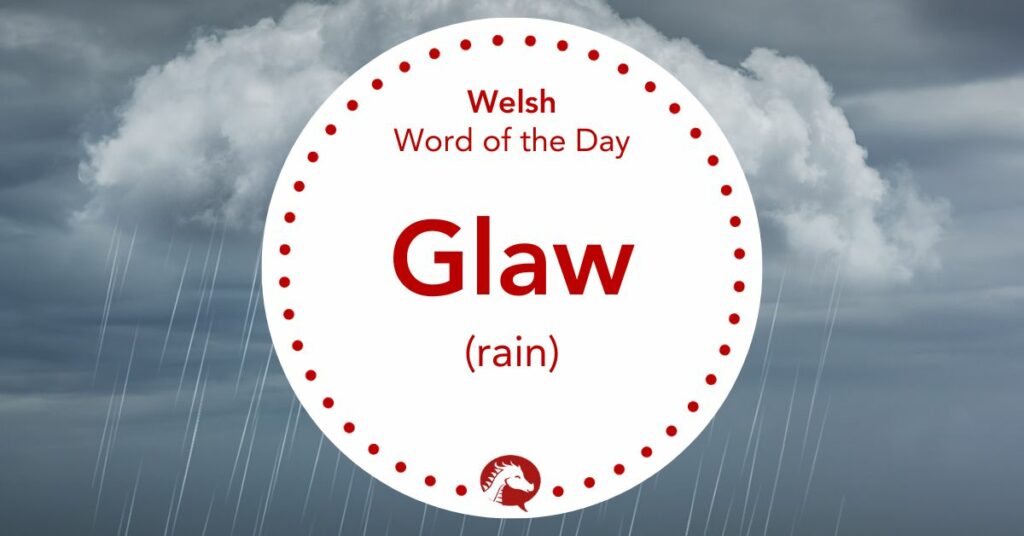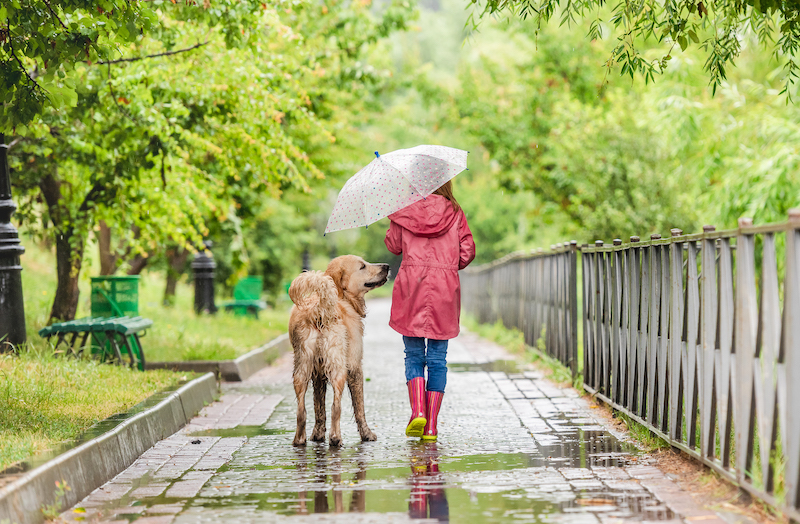One notable feature associated with Wales, in addition to its rugby team and male voice choirs, is its unpredictable climate. A day can commence with bright sunshine and warmth, only to swiftly shift into a blustery, rain-soaked tempest. It’s one of the reasons we love living here – you never know what to expect!
Today we will be focusing on the weather phenomenon that gives Wales its luscious green hills: the rain, or glaw in Welsh. It is a masculine noun that is usually uncountable, although the plural forms glawiau or glawogydd do exist.

glaw
rain
This word, along with the Breton glav, can likely trace its origins to an Indo-European root *PL-. This root also gave rise to pluie (rain) in French.
Glaw frequently appears in the set expression bwrw glaw which means “to rain” (or literally “to throw rain”) but it is often shortened to just bwrw. Alternatively you can use the verb glawio.
Mae hi’n bwrw glaw heddiw.
It’s raining today.
If you want to talk about light rain or drizzle in Welsh – and believe me, it’s a common occurrence – you can use the word glaw mân (literally “small rain”).
Roedd hi’n bwrw glaw mân neithiwr.
It was drizzling last night.
Another possible expression to describe light rain is pigo bwrw, with pigo meaning “to prick / pierce / sting“. It’s similar to saying “it’s spotting with rain” or “it’s spitting” in English.
Here are a few other words for light rain in Welsh, some of which are regional:
- glaw mynydd = drizzle that falls on high ground when it is dry in the lowlands (literally “mountain rain”)
- glaw smwc = another word for light rain that’s common in the north
- manlaw = fine rain
- briwlaw = drizzle (south western term)
- ffwgen = light shower (south western term)

Now let’s move on to heavy rain, generically known as glaw trwm. In Welsh, there are at least a dozen terms for this kind of rain, some of which are quite creative!
- curlaw = driving or pelting rain
- hyrddlaw = driving or pelting rain
- horslaw = pouring rain
- rhyslaw = heavy rain
- glaw gyrru = driving rain
- glaw bras = a downpour of large raindrops
- glaw gochel = a heavy downpour (literally “rain to seek shelter from”)
- glaw ‘Stiniog = heavy rain (like the kind you get in Blaenau Ffestiniog)
- ponlaw = heavy rain (southern term)
- hirlaw = unabatting rain (literally “long rain”), a south western term
- curin = sudden rainstorm (south western term)
However, in everyday Welsh, you will usually hear people say the following: Mae hi’n stido / tresio bwrw (stido and tresio both means “to thrash” in this case) or, in very colloquial Welsh, Mae hi’n piso bwrw (it’s pissing down).
Mae hi’n stido bwrw tu allan!
It’s pouring outside!
Below is a video by Welsh tutor Daval Donc that shows you how to pronouce tresio bwrw.
Two additional words you will encounter quite often are pistyllio and tywallt, both of which mean “it’s pelting down“.
They can be used by themselves e.g. Mae hi’n pistyllio / tywallt or with the added glaw at the end e.g. Mae hi’n pistyllio glaw / Mae hi’n tywallt y glaw.
Yet another possibility is Mae’n ei harllwys hi / Mae hi’n arllwys y glaw which literally translates as “to pour with rain“.
And we mustn’t forget one of my favourite expressions that involves drops of rain: Taflu dagrau / Mae hi’n taflu dagrau – literally “it’s throwing drops“.
At some point, you will probably come across the idiomatic expression Mae hi’n bwrw hen wragedd a ffyn (literally “to rain old wives and staffs”) but, much like “it’s raining cats and dogs” in English, it isn’t used very much in everyday speech, unless you want to generate a few laughs.
Finally we have an expression that derives from a Welsh nursery rhyme: Mae hi’n bwrw glaw yn sobor iawn. Sobor in this case doesn’t mean “sober” but rather “a lot“.
Bwrw glaw yn sobor iawn
Wel dyna b’nawn anghynnes
‘Mochel dan yr ambarél
A cherdded fel brenhines
It’s raining cats and dogs
Well, what a miserable afternoon,
Sheltering under the umbrella
And walking like a queen
